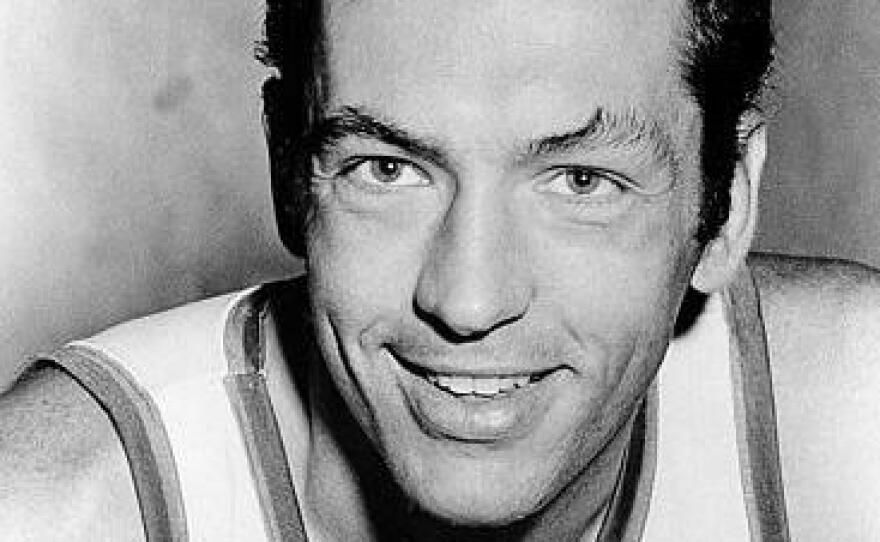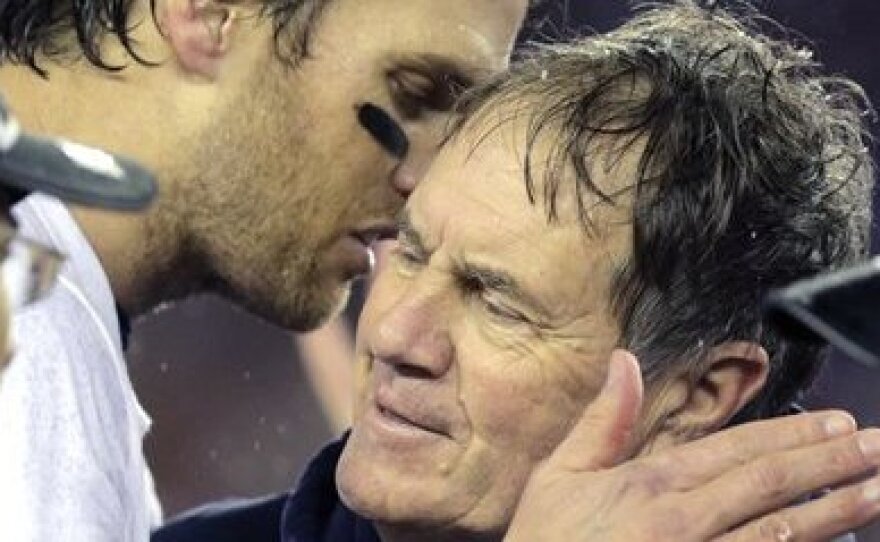

"The line between cheating and gamesmanship is constantly blurred," observes The New York Times in a recent story. The Times, and just about everyone else, is talking about the perhaps-tampering-with-gameballs allegations levied against the New England Patriots professional football team– specifically Coach Bill Belichick and quarterback Tom Brady.
Both Belichick and Brady have denied any wrongdoing.
In many sports situations, the truth may lie somewhere on the spectrum between cheating and gamesmanship — gaining a competitive advantage through psychological tricks or rules-bending or some other sneaky method. And that line has been blurry for a long time.
Widespread acknowledgment of "gamesmanship" really opened up with the publication of the 1948 British book The Theory and Practice of Gamesmanship, Or the Art of Winning Without Actually Cheating. In 1960 the British film School for Scoundrels swept across America and was advertised in newspapers as a course in gamesmanship.
And by the mid-1960s, American sports figures were touting the positive – and decrying the negative — aspects of gamesmanship.
Here then are 10 sports incidents, reported in the past 50 years. The question for you: Which ones exemplify cheating and which ones exemplify gamesmanship? Discuss.
1) The Denton Record Chronicle in Texas noted in 1965: Legendary Boston Celtics basketball coach Red Auerbach points out that after a turnover a player can return the ball to a referee very slowly to allow his team time to get down court and set up a defense. Auerbach also reminds players that "grabbing or pulling the pants or shirt of the opponent can be very aggravating." The suggestions came from Auerbach's writings on basketball. Here is one more from his popular book Basketball for the Player, the Fan, and the Coach: "Very often slight movements of the body are used to distract the opposing foul shooter."
2) Columnist Maury White wrote in the Des Moines Register in 1970 about the variety of ways that on-court opponents tried to get under the skin of Louisiana State University basketball phenom Pete Maravich. "The championship gambit, for my money, was the opponent who kissed Maravich on the cheek," White opined. "If Maravich had turned and slugged the guy, in view of thousands of people and two referees, he would have been out of the game. So Pete fumed silently – and the kiss accomplished its purpose."
3) Writing in the Los Angeles Times in 1975, Jim Murray called pro baseball the "most larcenous sport." He observed that "groundskeepers let the grass grow if they have a ground-ball pitcher throwing or water the base paths if the other team is faster. " He explained about players who added cork or extra pine tar to their bats. And, he reminded readers that in baseball: "Stealing is an honored occupation."
4) In 1977, a UPI reporter recalled the story of American long distance runner Fred Lorz who hitched a ride for part of the course to help him win the 1904 Olympics in St. Louis. According to the dispatch in the York Daily Record, "the cheers turned to jeers and expulsion."
5) In a 1999 Washington Post profile of then-presidential contender Bill Bradley of New Jersey – a former U.S. Senator and a former basketball standout for the New York Knicks and the Princeton University Tigers — the reporters tell of Bradley's penchant for "yanking" the body hairs of opponents. "Bradley also devised a humiliating trick play," The Post reported. When a teammate would take the ball out of bounds, Bradley would pretend that he was the one who should take out the ball. As he walked toward the sideline for the exchange, the teammate would toss the ball to Bradley, who would then turn on the unsuspecting opponents. "They'd back off him, and he'd get two free points," a Bradley teammate told the newspaper. "One team we pulled that on twice."
6) In 2003, a man who worked at the Metrodome in Minneapolis told the Associated Press that he had tried to help the Minnesota Twins win by turning on certain ventilation fans in the vast building "during the late innings of close games in an attempt to get baseballs to carry farther." The baseball team professed no knowledge of the matter.
7) Pro tennis star John McEnroe, according to a 2007 ESPN commentary, remembered an indoor match he once played in Memphis, Tenn., His opponent wiped the ball on his sweat-soaked shirt before each serve. "I asked the chair umpire if it was legal, and he said there was no rule," McEnroe said. "I think it added a little skid, an extra slide to the ball."
8) In 2010, a USA Today reporter remembered the 1982 "Snowplow Game" between the New England Patriots and the visiting Miami Dolphins. This was the "pre-Bradychick" Patriots, but there was still controversy when Pats coach Ron Meyer ordered a snowplow on the field to clear a space for his team's placekicker and the Pats won the game 3-0. Miami coach Don Shula later said it was the "most unfair act" ever committed in NFL history.
9) Professional golfer Greg Norman observed on his website in 2012: "During the 1986 U.S. Open Lee Trevino got me good. At the 10th hole one day, each of us had a tricky downhill birdie putt. Trevino hit first, and when his putt finished a foot or so past the hole he said to his caddie (for my benefit), 'Herman, that is the fastest putt I've seen all year long.' It worked. I left my approach putt five feet short and then missed the next one. Lee parred the hole and I bogeyed." Norman said: "Such gamesmanship may seem to stretch the limits of sportsmanship, but the fact is, everyone does it."
10) The New York Times published in 2012 a story about current and former professional tennis players, such as Monica Seles, who grunted loudly when they struck the ball. Danish star Caroline Wozniacki accused some of the women "of grunting for an edge because, she said, it was harder for opponents to hear how the ball was struck and consequently how fast it was traveling toward them." About excessive grunting, veteran tennis analyst Bud Collins added: "I'm sure players don't need to do it because you don't hear a peep from them when they're practicing. It's gamesmanship."
Getting Caught
Others take a tougher stand. Donna Lopiano, founder of the athletics consulting firm Sports Management Resources, once told a sportswriter: "Gamesmanship is just another word for cheating."
Seemingly there are twice-told tales of gamesmanship in nearly every sport, including Nascar, soccer, even women's Mixed Martial Arts.
"Like most professional athletes," says L.A. Jennings, an owner of a Mixed Martial Arts studio in Denver and author of She's a Knockout!: A History of Women in Fighting Sports, "fighters have to test for performance enhancing drugs prior to competing. However, the fighters, agents, promoters and the venue can arrange a timeline that basically allows evidence of the drugs to leave the fighter's system prior to testing."
Many MMA fighters, Jennings tells NPR, take some form of performance enhancer. Technically, she says, the performance-enhancer list even includes coffee. "The extent to which a fighter takes advantage of the array of supplements available — and if he or she is caught using steroids," she adds, "is what drives the constantly changing discourse regarding fighters and gamesmanship."
------------------------------------------------------------------------------
Follow me @NPRHistoryDept; lead me by writing lweeks@npr.org
Copyright 2015 NPR. To see more, visit http://www.npr.org/.






